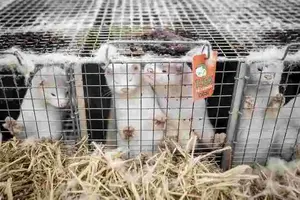
The decision in the past week by the Danish government to kill millions of minks due to Coronavirus concerns, effectively wiping out a major national industry, has spotlighted worries among scientists and conservationists concerning the vulnerability of animals to the virus and what infections among animals could mean for humans.
The most disturbing possibility is the virus mutating in animals and becoming more transmissible or dangerous to humans.
In Denmark, the virus has shifted from humans to minks and back to humans, and has mutated in the process.
Minks are the only animals known to have passed the coronavirus to humans, except for the initial spillover event from an unknown species.
Other animals, like cats and dogs, have been infected by exposure to humans, but there are no known cases of people being infected by exposure to their pets.
The versions of the virus that have mutated in minks and spread to humans are not more transmissible or causing more severe illness in humans. But one of the variants, found in 12 people so far, was less responsive to antibodies in lab tests.
The Danish health authorities worried that the effectiveness of vaccines in development might be diminished for this variant and took all possible measures to stop its spread.
This included killing all of the country's minks and effectively locking down the northern part of the country, where the mutated virus was found.
The World Health Organization and international scientists said they have yet to see evidence that this variant will affect vaccines.
Besides minks, dogs, cats and genetically engineered mice have also been infected with COVID-19.
Dogs and cats seem to suffer few ill effects. The other animals have exhibited varying responses.
Farmed minks, however, have died in large numbers in Europe and in the United States, partly because of the crowded conditions on those ranches, which could increase the amount of exposure.
Public health experts worry that any species capable of infection could become a reservoir for the virus to re-emerge, and likely mutate, at any time and infect people.
Conservation experts also worry concerning the effect on animal species that are already in trouble.
One approach to studying susceptibility is to look at animal genomes and see which ones have a sequence that codes for a protein on cells which allows the virus to latch on.
Dr Kate Sawatzki, the animal surveillance coordinator for a testing project in pets and other animals at the Cummings School of Veterinary Medicine at Tufts University, said 282 wildlife samples from 22 species have been tested.
"(They are) primarily bats in New England rehabilitation facilities, and we're happy to report that none has been positive."
She said they have also tested 538 domestic pets, some from households with people with Covid-19, and none has shown signs of active virus.
Dr Sawatzki said the lab also conducted blood tests for antibodies, which showed that pets looked to be getting infected but not getting sick or passing the virus on.
So far, the minks in Denmark are the only known instance of the virus infecting an animal, mutating and transferring back to humans.
- NYTIMES